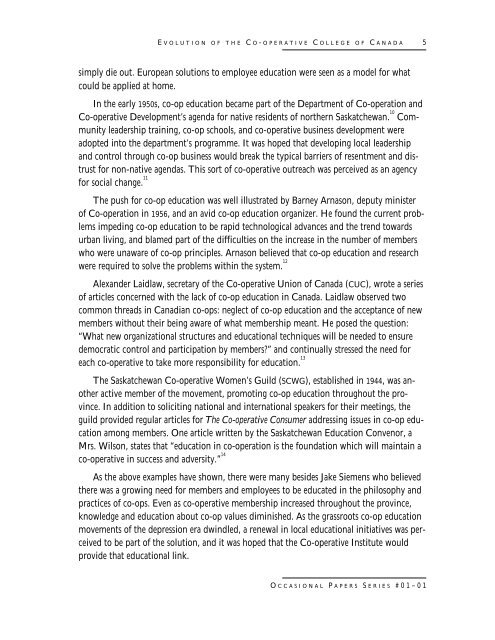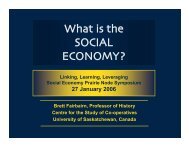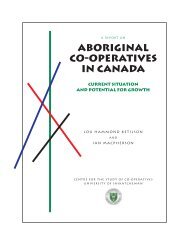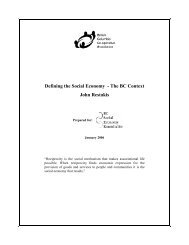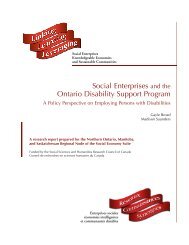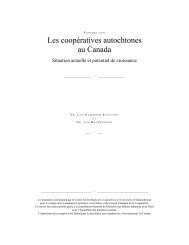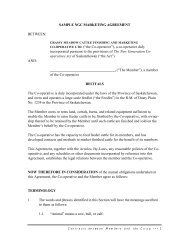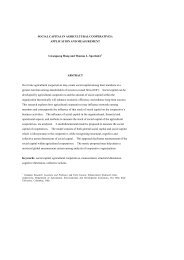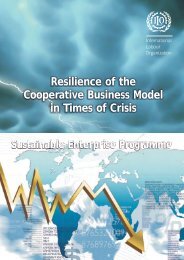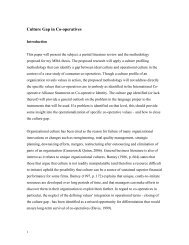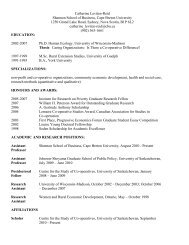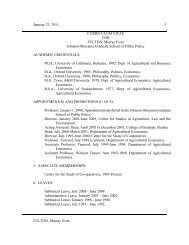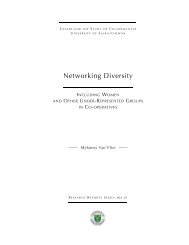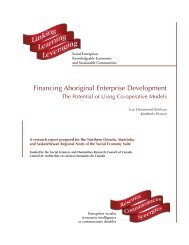Co-op College History - Centre for the Study of Co-operatives
Co-op College History - Centre for the Study of Co-operatives
Co-op College History - Centre for the Study of Co-operatives
Create successful ePaper yourself
Turn your PDF publications into a flip-book with our unique Google optimized e-Paper software.
E VOLUTION OF THE C O - OPERATIVE C OLLEGE OF C ANADA 5<br />
simply die out. Eur<strong>op</strong>ean solutions to employee education were seen as a model <strong>for</strong> what<br />
could be applied at home.<br />
In <strong>the</strong> early 1950s, co-<strong>op</strong> education became part <strong>of</strong> <strong>the</strong> Department <strong>of</strong> <strong>Co</strong>-<strong>op</strong>eration and<br />
<strong>Co</strong>-<strong>op</strong>erative Devel<strong>op</strong>ment’s agenda <strong>for</strong> native residents <strong>of</strong> nor<strong>the</strong>rn Saskatchewan. 10 <strong>Co</strong>mmunity<br />
leadership training, co-<strong>op</strong> schools, and co-<strong>op</strong>erative business devel<strong>op</strong>ment were<br />
ad<strong>op</strong>ted into <strong>the</strong> department’s programme. It was h<strong>op</strong>ed that devel<strong>op</strong>ing local leadership<br />
and control through co-<strong>op</strong> business would break <strong>the</strong> typical barriers <strong>of</strong> resentment and distrust<br />
<strong>for</strong> non-native agendas. This sort <strong>of</strong> co-<strong>op</strong>erative outreach was perceived as an agency<br />
<strong>for</strong> social change. 11<br />
The push <strong>for</strong> co-<strong>op</strong> education was well illustrated by Barney Arnason, deputy minister<br />
<strong>of</strong> <strong>Co</strong>-<strong>op</strong>eration in 1956, and an avid co-<strong>op</strong> education organizer. He found <strong>the</strong> current problems<br />
impeding co-<strong>op</strong> education to be rapid technological advances and <strong>the</strong> trend towards<br />
urban living, and blamed part <strong>of</strong> <strong>the</strong> difficulties on <strong>the</strong> increase in <strong>the</strong> number <strong>of</strong> members<br />
who were unaware <strong>of</strong> co-<strong>op</strong> principles. Arnason believed that co-<strong>op</strong> education and research<br />
were required to solve <strong>the</strong> problems within <strong>the</strong> system. 12<br />
Alexander Laidlaw, secretary <strong>of</strong> <strong>the</strong> <strong>Co</strong>-<strong>op</strong>erative Union <strong>of</strong> Canada (CUC), wrote a series<br />
<strong>of</strong> articles concerned with <strong>the</strong> lack <strong>of</strong> co-<strong>op</strong> education in Canada. Laidlaw observed two<br />
common threads in Canadian co-<strong>op</strong>s: neglect <strong>of</strong> co-<strong>op</strong> education and <strong>the</strong> acceptance <strong>of</strong> new<br />
members without <strong>the</strong>ir being aware <strong>of</strong> what membership meant. He posed <strong>the</strong> question:<br />
“What new organizational structures and educational techniques will be needed to ensure<br />
democratic control and participation by members?” and continually stressed <strong>the</strong> need <strong>for</strong><br />
each co-<strong>op</strong>erative to take more responsibility <strong>for</strong> education. 13<br />
The Saskatchewan <strong>Co</strong>-<strong>op</strong>erative Women’s Guild (SCWG), established in 1944, was ano<strong>the</strong>r<br />
active member <strong>of</strong> <strong>the</strong> movement, promoting co-<strong>op</strong> education throughout <strong>the</strong> province.<br />
In addition to soliciting national and international speakers <strong>for</strong> <strong>the</strong>ir meetings, <strong>the</strong><br />
guild provided regular articles <strong>for</strong> The <strong>Co</strong>-<strong>op</strong>erative <strong>Co</strong>nsumer addressing issues in co-<strong>op</strong> education<br />
among members. One article written by <strong>the</strong> Saskatchewan Education <strong>Co</strong>nvenor, a<br />
Mrs. Wilson, states that “education in co-<strong>op</strong>eration is <strong>the</strong> foundation which will maintain a<br />
co-<strong>op</strong>erative in success and adversity.” 14<br />
As <strong>the</strong> above examples have shown, <strong>the</strong>re were many besides Jake Siemens who believed<br />
<strong>the</strong>re was a growing need <strong>for</strong> members and employees to be educated in <strong>the</strong> philos<strong>op</strong>hy and<br />
practices <strong>of</strong> co-<strong>op</strong>s. Even as co-<strong>op</strong>erative membership increased throughout <strong>the</strong> province,<br />
knowledge and education about co-<strong>op</strong> values diminished. As <strong>the</strong> grassroots co-<strong>op</strong> education<br />
movements <strong>of</strong> <strong>the</strong> depression era dwindled, a renewal in local educational initiatives was perceived<br />
to be part <strong>of</strong> <strong>the</strong> solution, and it was h<strong>op</strong>ed that <strong>the</strong> <strong>Co</strong>-<strong>op</strong>erative Institute would<br />
provide that educational link.<br />
O CCASIONAL P APERS S ERIES #01–01


